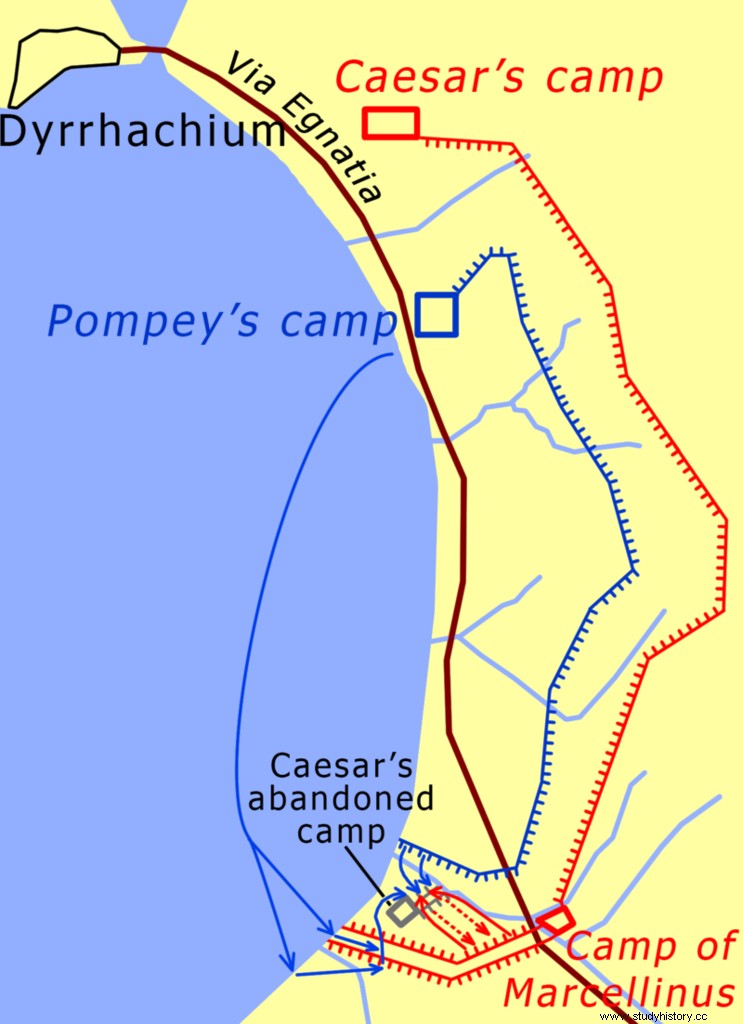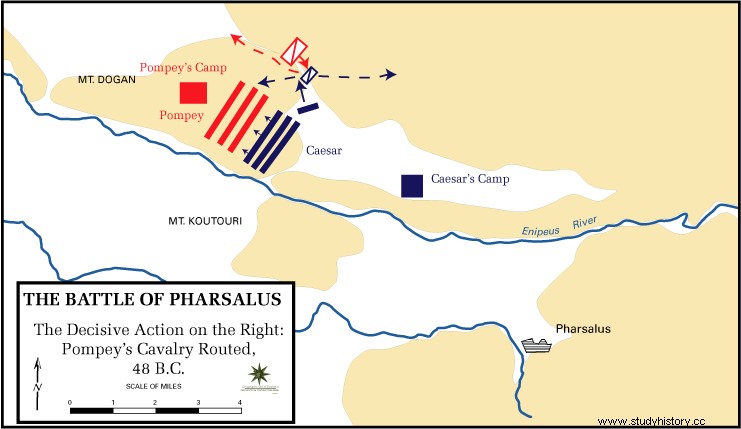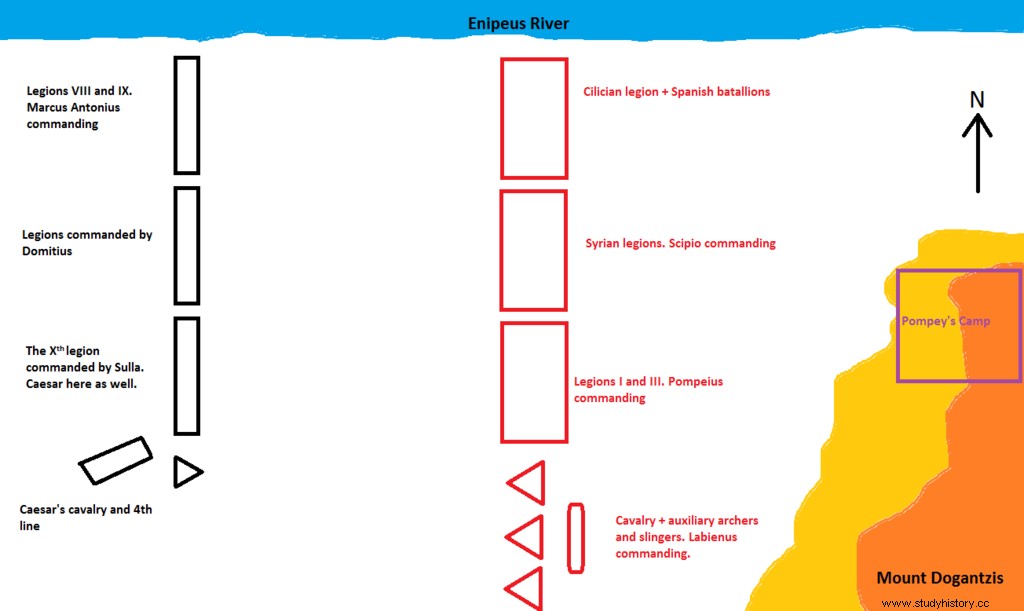"Battle of Actium" and "Battle of Kanne" are listed in history textbooks, but there is no textbook in Japan that describes the Battle of Pharsalus.
Thanks to that, I didn't even know the existence of this battle until I became a college student.
It can be said that it is a battle of higher importance than the Battle of Actium in the sense that it was the largest civil war in Rome and decided the course of Rome. It is this Battle of Pharsalus that corresponds to the Battle of Sekigahara in Japan.
Let's take a closer look at the battle of Pharsalus, where two Roman heroes fought for each other's lives and beliefs, and the clashes between the strongest.
Two heroes
The Battle of Pharsalus was not only the battle between Caesar and Pompey, but also the battle between the Caesar faction and the Senate faction.
Rome is completely divided into two parts, and it is not uncommon for parents and children to compete with each other.
The Senate, the highest decision-making body in Rome, issued a "Senate Final Warning" to Caesar, who decided to cross the Rubicon River without disbanding the army, and the sword was thrown.
The Senate was afraid of Caesar's march, and everyone ran away in a scattered manner. Pompey, who became the head of the Senate sect, moved to Greece, which is within his own power, and took the stance of accumulating troops and defeating Caesar.
Pompey has never lost.
From a young age, he repeatedly won consecutive battles and raised the territory of Rome to the maximum.
He once sneaked into Sulla's forgiveness, annihilated the remnants of the civilian sect in Spain, annihilated the Greek pirates, and ended the Mitridates war. He eventually became Rome's greatest hero by destroying Antigonid Syria and making it Roman territory, even nicknamed Pompey Manu (Magne means Great King).
Caesar, on the other hand, is the hero who established control of what is now France, England, the Benelux, and the western quarter of Germany in the land of Gaul.
Caesar and Pompey used to join hands.
Together, they managed the Triumvirate, and Caesar married his only daughter, Julius, to Pompey.
Pompey loved, loved, and loved Julia.
However, after Crassus died and Julia died, the two gears were quietly misaligned.
Pompey, overwhelming
The two heroes clashed for the first time in Duracchium, Greece.
The game ended with an overwhelming victory for Pompey.

Pompey stopped pursuing because of the overwhelming victory. He thought there should be some trap.
There wasn't really anything. Caesar later said that if Pompey was chasing him, he would have lost.
Pompey had an overwhelming victory, but he was not without anxiety. Many of Caesar's corps were elite among the elite who fought together on the Gallic expedition, but many of Pompey's corps were made up of recruits.
Furthermore, it was anxious that Pompey itself had not been in the battlefield for nearly 10 years.
All the enemies around Rome were overwhelmed by Pompey.
And even more worrisome were the senators who were supposed to be on their side.
It is this Battle of Pharsalus that tells us that it is not the enemy but the incompetent ally that is really scary.
Pompey did not pursue Caesar, but not only did he think there was a trap, but he also made a strategic decision.
Caesar's army was low on troops. He cannot be expected to be adequately replenished because the Greek ground was in Pompey, which was named for the extermination of pirates. That is why Pompey ambushed Caesar in Greece.
If you bring it into endurance battle, Caesar will self-destruct. That was the aim of Pompey.
However, the Senators, with the exception of Pompey, drowned in Duracchium's victory. No matter how you think about it, you can't lose. Pursue Caesar and regain Senate-led politics in Rome! Let's regain our interests! That said, he persuaded Pompey.
As a warrior, Pompey would be one of the top five in Roman history.
But the hero was totally untalented when it came to politics. Pompey has no political beliefs. This is what historians later say in unison, which determined the fate of Pompey.
Caesar, overwhelmingly disadvantaged
Theoretically, Caesar couldn't win by any means.
Even if you are not a member of the Senate, it is a battle that cannot be defeated by Caesar.
But Caesar won.
The military composition of both armies was like this.
Pompey side (Senate side):Approximately 60,000, of which 7,000 cavalry
Caesar side:Approximately 23,000, of which 2,000 cavalry are weak
Romans have often overturned their military disadvantages. The Cimbrian War, where Marius won a big victory against 100,000 Germanic people, the Mithridates War, where 30,000 soldiers led by Sulla won over 100,000 troops, and the Battle of Zama.
But this time it's a battle between Romans.
There was a civil war like Marius and Sulla, but this was the first time a Roman battle had occurred.
Rome struggled a lot in the Social War, a war between the Romans and their allies.
Rome has overturned its disadvantages due to differences in tactics, training, and equipment.
Or, Scipio beat Hannibal because he lost in the number of soldiers but won in the number of cavalry.
Caesar also lost in the number of his cavalry. Moreover, the enemy is Pompey, who has not been defeated in the past.
In such a situation, no soldier escaped on the Caesar side. No one believed in victory and did not doubt it. No one suspected Caesar.
This is not our graveyard. No one doubted it.
Simple and powerful tactics

Anyone born in Rome learns how Scipio Africanus defeated Hannibal at an early age.
Of course I learned Caesar and Pompey.
The whereabouts of the game are determined by the number of cavalry.
The Battle of Zama proves that the one with more cavalry wins if it is a battle between commanders of the same level.
So Caesar considered incapacitating the cavalry. It's a simple way that no one can think of.
Horses are gentle creatures, so basically they don't trample on other creatures. So if you stand in front of a cavalry with infantry, the horse will stop.
It's almost like a child would think, but that's why Pompey didn't notice it.
Caesar chose the elite of the elite and stood in front of the assaulting Senate cavalry. From the cavalry side, it would have seemed like a complete suicide. But it was the cavalry who lost their lives a few minutes later.
Don't jump out, the car won't stop suddenly
This is the slogan I used to put on the sign when I went to school, but so is the horse.
The horse tried to stop because he didn't want to hurt humans. However, the formation was greatly disturbed without stopping.
The Senate's army has become like a rear-end collision.

The Caesar cavalry corps from behind was charged there, and the 7,000 cavalry corps was completely destroyed.

Later historians saw the results of Farsala and said that if Caesar and Pompey fought together, they would not have been any enemies.
In fact, there were no enemies in Rome.
Hannibal, who was once defeated by Rome, has left such words.
" No matter how strong a country is, it cannot remain safe for a long time. Even if it has no enemies outside the country, it will have enemies inside the country.
A stubborn body that keeps away enemies from the outside suffers from visceral diseases because it cannot keep up with the growth of the body due to internal diseases of the body. Similar to having.
Rome, which had no enemies, had no choice but to crush each other.
Pompey, who realized the disadvantage, ran away.
He was killed in Egypt, where he fled.
It's the sad end of a master who lost only once in his life.
In history, if Julia, the daughter of Caesar and the wife of Pompey, was alive, and if Crassus did not die in the Parthian Empire, the relationship between the two heroes would have been completely different. I don't know.
The goddess of victory smiled at Caesar.
Caesar forgave all of his enemies on the Senate side in Farsalas.
And they were killed by them.
Conflict may, after all, be just a new source of conflict.
